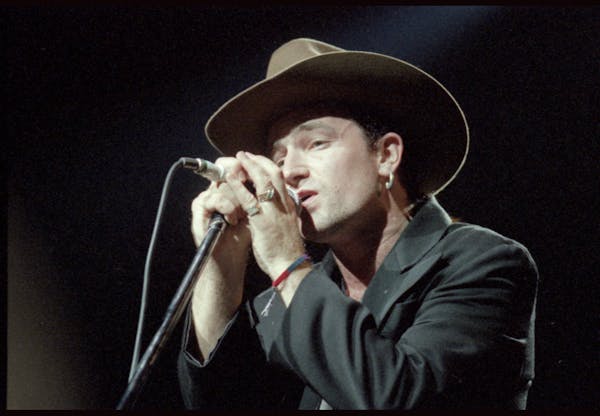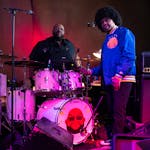The first time I heard the song in concert was from the 11th row at the St. Paul Civic Center. My brother and I — knuckleheads then only acclimated to heavy-metal concerts — started jumping over chairs and rushing the stage in excitement, only to be politely shooed away by confused-looking U2 fans.
The last time I heard it performed live was two months ago from the umpteenth row of Soldier Field in Chicago. My heart did the only jumping in that case, but it was quite a leap since I knew exactly which 10 songs would follow.
I don't care how cool a music listener you fancy yourself or how much you think Bono is a self-righteous poseur, if you too don't feel at least a minor spark when you hear the misty synthesizer and then the Edge's deluge-like guitar part at the start of U2's "Where the Streets Have No Name," you should go see a doctor while you still have health insurance.
U2 fans love "Streets" even more for the fact that it's the opening salvo of "The Joshua Tree." Not only was that 1987 album the best of U2's 37-year recording career, it's also now the centerpiece of the biggest concert tour of 2017, finally pulling into town Friday at U.S. Bank Stadium.
As they did in Chicago and every other city this summer, the Irish quartet will perform "The Joshua Tree" in full at the new Vikings stadium (where fans will be praying like the biblical Joshua for decent acoustics). It's all accompanied with imagery from filmmaker/photographer Anton Corbijn on a stunning, 200-foot-wide, super-hi-def video screen that's as awesome as any of the band's visual stunts. Yes, even better than the lemon ball.
Bravo, Bono. For more reasons than pure nostalgia — which U2 has generally avoided in concert, though perhaps it can't afford to any longer — "The Joshua Tree" is one record that deserves to be revisited in full on stage.
Sonically, the 11-song collection holds up better than most '80s albums, which were largely overproduced and intended more as soundtracks for MTV videos. Its famed producers, Daniel Lanois and Brian Eno, knew a thing or two about making LPs sound timeless, having also worked with Bob Dylan and David Bowie, respectively.
Commercially, "The Joshua Tree's" giant success is also worth revisiting. It gave the band two No. 1 singles, "With or Without You" and "I Still Haven't Found What I'm Looking For." It brought them from punk clubs like First Avenue — where they played to 500 people on April 9, 1981 — to stadiums in just seven years. It topped the album charts for many weeks in 20 different countries. It sold 25 million copies.
When U2 came to St. Paul for back-to-back nights in 1987, Bono himself marveled at the band's still-growing popularity.
"Coming into this city in a car today, I heard this song on the radio and it made me feel very good indeed," he told the sold-out crowd (the quote comes verbatim off the cassette bootleg I made that night). "I think back to the times when it was very hard to find a U2 song on the radio, and I'm glad times have changed."
Music fans not alive in 1987 may not fully understand how some records in the pre-digital era would get so big that you could hear the singles on six or seven different stations and find cassette copies on sale at Kmart and Montgomery Ward (retail stores; look 'em up). "The Joshua Tree" was one of the last albums to do so. The universality of it alone is something to celebrate in These Disparate Cultural Times©.
Thematically, "The Joshua Tree" not only holds up in 2017. It thrives.
After celebrating the Rev. Martin Luther King Jr. and his American dream on its prior album, 1984's "The Unforgettable Fire," the band examined the more nightmarish aspects of U.S. life on its 1987 opus, which came out near the end of the eight-year Reagan administration.
"Where the Streets Have No Name" was inspired by the growing gap between the rich and the poor, and the neighborhoods where they reside. "Bullet the Blue Sky" took shots at the military-industrial complex. "Running to Stand Still" addressed the rising plight of drug addiction. "Exit" explored the dark depths of a religion-drunk mass killer. "In God's Country" revisited the idea of Lady Liberty lighting the way for immigrants.
Any of this sound familiar?
At the Chicago concerts in June, Bono was cunningly careful — some might say wimpy — about not turning his between-song banter into a contest of America's current us-vs.-them politics. He never once mentioned President Donald Trump or any political party. The one hot-button issue he addressed was immigration, and that was to say "thank you for the safety and refuge for Irish people for 100-plus years."
The singer did mention George W. Bush on stage in Chicago, and that was to praise him for his work with the U2-affiliated One Campaign in alleviating the AIDS crisis in Africa: "Eighteen million people are alive now thanks to U.S. taxpayers," the singer raved.
More so than in 1987, the message of performing "The Joshua Tree" for U.S. audiences in 2017 seems to be that we can still make America great again. Now that certainly sounds familiar.
And maybe U2 needs a reminder of its greatness, as well. The band's only two albums of the 2010s were commercial duds. Its deal with Apple to make the lesser of those two records, 2014's "Songs of Innocence," an automatic download for iTunes users was met with a backlash big enough to even make Kanye West say, "What were you thinking?" And let's face it, the lads aren't virile young men anymore. A reminder of their glory days must feel good.
Then again, I probably couldn't jump over concert chairs like I did in 1987. We might find out Friday.





